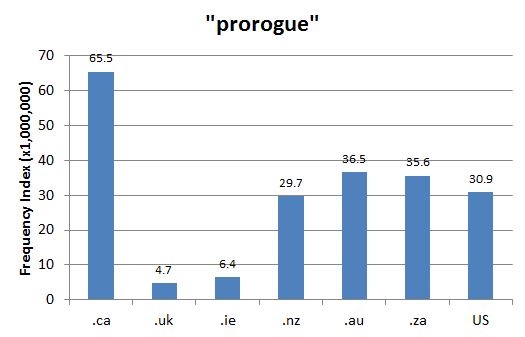DCHP-2
prorogue DCHP-2 (July 2016)
v. — Politics
to prematurely end a session of Parliament, without dissolving it and thus triggering an election.
Type: 5. Frequency — Prorogue is a preservation from British English, in which the term has been used since the 17th century (see OED-3, s.v. "prorogue" (3b)). A prorogation ends a session of parliament without triggering an election and requires the permission of the Governor General or Lieutenant-Governor. Although circumstances may justify this move, it has been used by prime ministers to avoid censure or a non-confidence vote, notably by John A. Macdonald in 1873 during the Pacific scandal and Jean Chrétien in 2002 during the sponsorship scandal.
Although prorogue is used in other nations with parliaments, the term has acquired cultural significance in Canada recently due to the controversial prorogation of Parliament by the Conservative government of Prime Minister Stephen Harper in 2008. Faced with a proposed Liberal-NDP coalition, supported by the Bloc Québécois, Harper evaded a non-confidence vote by requesting the Governor-General to prorogue Parliament (see CBC reference, "GG agrees to suspend Parliament until January").
Harper again requested a prorogation of Parliament in late 2009, with the stated reason that the government needed to consult with Canadians and businesses in order to move forward with its economic action plan. However, many critics believed that the move to prorogue Parliament was strategically planned in order for Harper to avoid further criticism for the alleged abuse of Afghan detainees (see CBC reference, "PM Shuts Down Parliament until March"). Both instances of prorogation were granted and sparked widespread criticism, protest and debate. As Chart 1 shows, the term is most frequent in Canada.See also: Liberal Party NDP bell-ringing Bloc Québécois non-confidence
References:
- CBC "PM shuts down Parliament until March" Accessed 22 Aug. 2013
- CBC "GG agrees to suspend Parliament until January" Accessed 22 Aug. 2013
Images:
Chart 1: Regional Domain Search, 4 Mar. 2015
